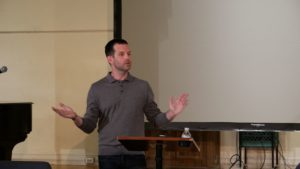By Blake Tommey
“The world needs you to speak ‘God,’ especially in this moment,” Jonathan Merritt, award-winning writer on religion and culture, said at the Cooperative Baptist Fellowship’s annual Advocacy in Action conference on March 14 in New York City.

Jonathan Merritt speaks at 2019 CBF Advocacy in Action conference. EthicsDaily.com Photo.
“Do you believe in God?” Merritt continued. “That is, do you love God and have you taken a step of faith? Then that spark should start a fire on your lips. Even though ‘speaking God’ is in massive decline in America, all is not lost. I believe we can revive the vocabulary of faith and that’s my prayer for each of you—that you’ll become courageous, vulnerable, passionate God-speakers again.”
Advocacy in Action, traditionally held each year in Washington D.C., kicked off March 11 at host Metro Baptist Church, where more than 60 participants from across the Fellowship engaged the work of advocacy and the urban church. Throughout the four-day conference, participants visited the United Nations, the historic Riverside Church, Tenement Museum and learned about the work of immigration advocacy, religious liberty and racial justice from area Baptist pastors, CBF field personnel and community and government leaders on homelessness and hunger. Participants also visited Brooklyn’s Plymouth Church of the Pilgrims, a congregation founded by abolitionist leader Henry Ward Beecher and a central stop on the Underground Railroad.
Merritt, a resident of Brooklyn, joined the participants for their final day of conversations at MBC, where he followed a panel on urban hunger with a plea to reclaim overt faith language. Advocacy, in the name of a loving God, takes place in our everyday speech and conversation, Merritt said. The problem is, he added, hateful and destructive faith language dominates the conversation because moderates and progressives have shied away from talking openly about faith.
“Believers like you and me stop speaking God because we don’t like what these words have come to mean and the way they’ve been used,” said Merritt, whose latest book is titled Learning to Speak God from Scratch: Why Sacred Words Are Vanishing—and How We Can Revive Them. “But when we stay silent, all those people who are causing the problem get to hog the microphone.” Too many problematic voices—televangelists preaching for profit, politicians spreading xenophobia and bigotry or pastors peddling condemnation—are setting the tone for Christianity with their words, Merritt explained. “They dominate the conversation because we’ve stopped speaking God.”

Participants of the 2019 CBF Advocacy in Action conference pictured outside of the United Nations headquarters in New York City. EthicsDaily.com Photo.
In fact, he said, more than one-fifth of Americans admit they have not had a spiritual conversation at all in the last year, and only seven percent say they talk about spiritual matters about once a week. That’s surprising, Merritt explained, because the vast majority of Americans say they believe but do not speak about their faith. As for practicing Christians who attend church regularly, he added, only 13 percent are having spiritual conversations about once a week.
But how does the church find its voice again? How do we regain confidence in the language and vocabulary of faith? First, Merritt explained, Jesus followers must cultivate the courage it takes to have spiritual conversations, even with strangers on the subway or in the workplace. With courage, he said, the church can push past the skepticism and cynicism that typically dominates the public sphere, especially in urban settings like New York City.
Second, he added, Jesus followers must cultivate the vulnerability necessary to make faith language authentic and generous.
“To speak God doesn’t mean to preach at people,” Merritt said. “It means opening your heart and your spirit to share what is inside, to discuss your doubts and your darkness, your struggles and your sorrow. And that takes vulnerability. What are you doing in your life—this month, this week—to nurture vulnerability? You’ll need it to speak God.”
Finally, Merritt charged the church with developing the passion it takes to reclaim faith language. Instead of falling back on cognitive belief statements—a not-so-helpful result of the Enlightenment—Jesus followers must rekindle a genuine love and passion for God, Jesus and the spiritual life, he said. When you truly love something, Merritt explained, you will naturally speak openly about it.

“You know something in your head, but you believe something in your heart,” he said. “In fact, perhaps the best synonym for the ancient word ‘to believe’ is the word for ‘to belove,’ not ‘to know.’ Paul says that we fall in love with God, Jesus and the spiritual life, and that begins to bubble up and spill out of our mouths. So, what are you doing to stoke your love of God and spirituality each day? By nurturing your passion for God, you’ll find that it becomes easier for you to speak God again.”
Ultimately, the story of God’s action in the world is the story of the power of words, Merritt said. With words, God brought life to all creation and endowed humanity with God’s own image. With words, Jesus proclaimed good news to the poor and release to the captive. Jesus’ last commandment was to go into the world and “speak God,” he added. As today’s religious, political and social tumult continues, Merritt explained, the church has an opportunity to reclaim this rich tradition of words and allow faith language to instill grace and hope once again.
Watch a bonus video interview with Jonathan Merritt courtesy of CBF-partner EthicsDaily.com.
View other EthicsDaily.com video interviews with Advocacy in Action participants here.
The Cooperative Baptist Fellowship is a Christian Network that helps people put their faith to practice through ministry efforts, global missions and a broad community of support. The Fellowship’s mission is to serve Christians and churches as they discover and fulfill their God-given mission. Learn more at www.cbf.net.
